new posts in all blogs
Viewing: Blog Posts Tagged with: Editors, Most Recent at Top [Help]
Results 26 - 50 of 566
How to use this Page
You are viewing the most recent posts tagged with the words: Editors in the JacketFlap blog reader. What is a tag? Think of a tag as a keyword or category label. Tags can both help you find posts on JacketFlap.com as well as provide an easy way for you to "remember" and classify posts for later recall. Try adding a tag yourself by clicking "Add a tag" below a post's header. Scroll down through the list of Recent Posts in the left column and click on a post title that sounds interesting. You can view all posts from a specific blog by clicking the Blog name in the right column, or you can click a 'More Posts from this Blog' link in any individual post.
 The executives at Simon & Schuster Children’s Publishing will launch an eponymous imprint for editorial director and vice president Caitlyn Dlouhy. Caitlyn Dlouhy Books will be under the Atheneum Books for Young Readers division.
The executives at Simon & Schuster Children’s Publishing will launch an eponymous imprint for editorial director and vice president Caitlyn Dlouhy. Caitlyn Dlouhy Books will be under the Atheneum Books for Young Readers division.
This new imprint will publish approximately 20 titles per year. The inaugural list will kick off in Spring 2016.
Dlouhy gave this statement in the press release: “The strength of voice in characters is what I believe most helps kids as they find their own voices. I’m thrilled and deeply grateful that Simon & Schuster continues to emphatically support my quest to find those voices, those stories that speak to the hearts of young readers.”
 Kelley Ragland has been promoted to associate publisher at the St. Martin’s Press imprint, Minotaur Books. She will also continue to serve as the editorial director.
Kelley Ragland has been promoted to associate publisher at the St. Martin’s Press imprint, Minotaur Books. She will also continue to serve as the editorial director.
Vice president Andrew Martin gave this statement in the announcement: “Over the past 22 years Kelley has become one of St. Martin’s most dedicated practitioners and advocates of the mystery and crime fiction trade, creating an impressive standing and profile within and without these Flatiron walls.”
Ragland has been with the company since the launch of the imprint in 1999. Some of the authors she has worked with include Chelsea Cain, Steve Berry, and Allison Brennan.

HarperCollins announced that a sequel for Harper Lee’s beloved novel, To Kill a Mockingbird. One day after this revelation, the book, entitled Go Set a Watchman, has claimed the No. 1 spot on the Amazon Best Seller list. Readers will have to wait until the July 14th release to meet the adult Scout Finch.
Hugh Van Dusen, Lee’s editor at HarperCollins, sat for an interview with Vulture to discuss the forthcoming book. Van Dusen confirmed that it was written before To Kill a Mockingbird and that the manuscript will likely be published as Lee wrote it back in the 1950’s. He also came to Lee’s defense and quashed the rumor that she is a recluse. He feels that people confuse Lee’s infamous distaste for publicity with a predilection for solitude.
Van Dusen explained: “There’s this rumor about her that’s been prevalent for decades that she’s a recluse, which is absolute nonsense. She’s not a recluse. When my wife and I went to visit her in hospital after the stroke to see her, the room was filled with wonderful women friends of Nelle’s who were all caring for her and helping her and comforting her. She’s not a recluse at all.”
 Jordan Hamessley will join Adaptive Books.
Jordan Hamessley will join Adaptive Books.
Hamessley has been brought on to serve as the editorial director for all imprints. Her start date has been scheduled for February 9th.
Throughout her career, Hamessley has held editorial positions at Egmont USA and Grosset & Dunlap. In the past, she has worked with authors Ilsa J. Bick, Bree Despain, and Adam-Troy Castro.

Have you ever wondered what the life of a book looks like? Erika Imranyi, an executive editor at the Mira Books division of Harlequin, has decided to illustrate this with emoji symbols. From there, she shared the finished piece on Twitter. What do you think? (via the Epic Reads tumblr page)
In prep for my workshop at CANSCAIP's Packaging Your Imagination, I asked literary agents, editors and art directors a few questions about whether they research potential clients, authors and illustrators online and what they look for. 18 editors (some of whom also look for picture book illustrators), 8 agents and 2 art directors responded.
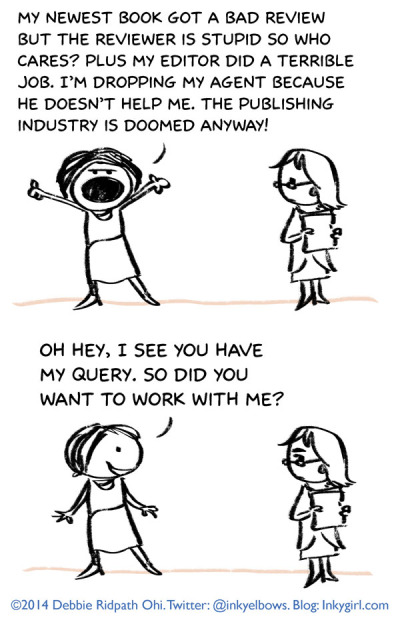
Here's what they said:
QUESTION: When you are considering taking on a new client/author/illustrator, do you ever research them online?
77% of respondents said that when they are considering taking on a new client, author and illustrator, they ALWAYS research them online. The rest said they sometimes do.
QUESTION: If you do online research before signing on a client/author/illustrator, has your research ever made you decide NOT to sign them on?
62% said that YES, they have decided to reject someone after researching them online. Some said that while they hadn't yet rejected someone after online research, they would definitely think twice about signing with someone who posts a lot of negativity (see below) or posts "with cringe-inducing syntax."
OTHER COMMENTS:
In this section, I invited respondents to volunteer additional comments, including turn-ons and turn-offs, what they look for during online research.
The following respondents gave me permission to use their names.
 Christie Harkin, Consultant Publisher at Clockwise Press:
Christie Harkin, Consultant Publisher at Clockwise Press:
"I have been turned off by authors/illustrators who bad-mouth their editors/publishers/agents. It is amazing to me when I see this on Facebook. Even if you don't mention your editor/publisher by name, it is usually very obvious to whom you are referring. I would definitely think twice about taking on someone who did this. Also, I look for authors/illustrators who are generous in sharing news about others in the community. People who only post promo about their own books (BUY MY BOOK! LOOK AT MY STUFF!) are not generally as well-received or connected with the larger community. If you are a new or emerging creator, you need to be engaging with others who are also plugged in to the kidlit world."
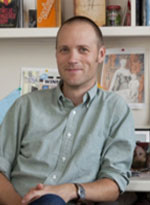 Andrew Karre, Editorial Director at Carolrhoda Books:
Andrew Karre, Editorial Director at Carolrhoda Books:
"An extent online presence is not a necessity. It's gravy. But . . . I place a certain amount of value on a social media presence that seems human and natural and interesting. A Twitter stream that is full of interesting engaged conversations on a variety of topics--even topics other than books--is somewhat more interesting to me than one that is all review links and retweets. I don't much care how many followers. (Unless, of course, it's a huge number, because I am not an idiot about what that means.)"
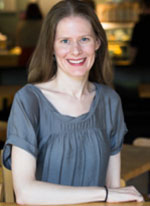 Carol Hinz, Editorial Director at Millbrook Press:
Carol Hinz, Editorial Director at Millbrook Press:
"I'm not necessarily looking for something in particular when I look up an author or illustrator. I simply want to find out if the person has a web presence and, if so, what it is. It's also helpful to get a sense of what else they've done, how they present themselves, whether they do school visits, and what helpful connections they may have (whether it's with other writers, educators, booksellers, etc.) when it comes to book promotion."
Other Comments:
NOTE: Most of the respondents answered anonymously but to avoid the awkward he/she decision, I decided to use "he" or "she" randomly.
One agent said she decided not to request material from previously published authors who got combative with reviewers. Another respondent said that while he hadn't yet rejected a project based on online research, he may make a note to discuss proper online etiquette with that particular author or illustrator. "But I believe the day is coming where my online research will make me answer 'no' when I question, 'Do I love this book enough to want to deal with THIS'?"
Another respondent said that online research sometimes makes her ask more questions, change the direction or focus of the conversation, dig deeper ("and not always in a negative way"), sometimes for the benefit of both of them and sometimes in ways that lead to more meaningful partnerships.
"Biggest turn-off: Writers who get argumentative and/or rude with reviewers and bloggers online. I also look at blog and social media posts that see how the writer comes across in their daily interactions. I'm wary when a writer acts rude, cynical, prejudiced, or pessimistic on social media. That's not to say that people can't have down moments, but if their overall feeds are full complaints and abuse toward others, it's an immediate "no." I've been lucky, though, to have found clients who are all positive, dedicated writers open to criticism and growing in their craft."
"I'm usually just looking for more information and/or to confirm my initial impression. I do notice if someone writes extensively about the writing and publication process ("got another rejection today!") or if he/she does a lot of self-publishing. Neither of these are deal-breakers at all, but they present unique challenges. I actually do most of my sleuthing with agents and agencies, and in that case I do judge if I see a lot of awful self-published covers (but again, may still work with them). Also, I assume writers and agents research me online but the less I'm reminded of that, the better—like don't start every email to me by mentioning something I've posted on Facebook. I don't like the feeling of someone friending me on social media in order to 'gain access.'"
"I look for obviously divisive posts, things that I see that I think would turn off a readership. Professionalism online is important, and also gives me an idea of what you'd be like to work with. I also look to see how you interact with others on your blog/twitter/site whether or not you acknowledge people who leave comments or tweet with you."
"Turn offs= being unprofessional/rude/inappropriate in a public online setting. Why would I want someone with that type of behavior linked to me as an agent and the agency as a whole?"
"When researching someone online, I'm generally just looking to flesh out my knowledge of that person in advance of a possible acquisition. I'm not actually looking for trouble spots, just maybe things to discuss at an IRL meeting with colleagues (sales points) or with the author themselves (small talk). When it's an illustrator, particularly; I do a lot of triage online before anyone's necessarily aware that I'm looking - I use online portfolios to identify leads. I'd advise artists to have as much art available to view online as possible. Use places like deviantart if you don't have a well-maintained personal site or an illustration agent with a good easily searchable site. Probably use deviantart even if you do. The easier your work is to find, the more work you'll pick up. I've been involved in acquisitions where a Google search turned up a certain amount of Internet Drama. It never really influenced the decision - we signed people up each time. I could imagine scenarios in which it would be a deal-breaker - for example, if we discovered that an author was a Neo-Nazi, that wouldn't play well - but none of them has so far come to pass. Incidentally, I think the situation in which duly diligent research is crucial is if you are an author or illustrator being offered work by a publisher or agent. You need to check out the bona fides of the person or company asking to contract with you, because there are an awful lot of sharks out there." - @iucounu on Twitter
"Turn ons - lots of work with the same energy and talent that brought the illustrator to my attention in the first place. Turn offs - samples that look dated, have styles that are very different and less appealing to me than the first sample I saw, very few samples."
"Online turn-offs: people who tweet way too often, people who only speak and don't engage others in conversation, people who are far too self-promotey, people who share way too much of their personal lives, people who are far too neurotic (tweeting constantly about writing woes and insecurities), people who are far, far, far too negative about anything and everything, and the biggest of all: people who feel the need to insult other writers/houses/editors/agents. Oh, and also, writers who quote themselves online. Online turn-ons: people who engage in meaningful discussion (without hitting me on the head with a hammer), people who find that balance between an online persona and being who they really are, people more interested in building a community than shilling their work, people who are endlessly supportive of fellow writers (without being obnoxious about it). What I really want to learn when I research a writer online is what they're after. Did they write the book to jump on the gravy train, hoping it would be the quick path to fame and fortune? Did they write the book because they scoff at the genre they just wrote and wanted to prove anyone could do it? Or is this someone who is serious about building a writing career and not just receiving the adulation of thousands of strangers? THAT'S the writer I want to work with. Someone dedicated to their craft and not their number of Facebook friends or Twitter followers."
(On whether they have rejected someone after online research) "Not if I really, really love the book, but if an author has exhibited abrasive or unpleasant behavior online, it definitely makes me think twice about signing them. When I sign someone, I'm not just signing up the project--I'm going to have to work with the author for a long time, and I prefer not to invite a headache into my life. While a great web presence is a definite plus, I'd never turn someone down for a lackluster web presence. But if I discover combative, difficult behavior, etc, I have to decide if this person is worth the unpleasantness they'll likely bring to my life. Because people are usually consistent--ie, if they're unpleasant to some people, they'll probably be unpleasant to me too if and when any difficulties in our working relationship arise."
-----
Curious about my other publishing industry surveys? Feel free to browse current and past Inkygirl Surveys online.
We talk so much to authors about the importance of branding yourselves. Of picking a genre and sticking with it or at least identifying what you're really strong at and making sure that comes through in your brand. We encourage authors to have a brand and a hook and tell them that they should be able to pitch themselves easily and succinctly when asked. But what about agents and editors? Shouldn't we be required to do the same?
Yes, absolutely. And it drives me crazy that so few can or do.
When anyone asks an agent or editor what they are looking for we should be able to give a few really strong concrete answers.
It drives me crazy when I'm meeting a new editor and looking to find a way to make her stand out and feel special enough to submit to and what she gives me when I ask what she's looking for is the company line. Yes, I know your company publishes contemporary romance and suspense, but what I want to know is what floats your boat personally. If I already have a relationship with Jane, Betsy, and Amy at your publisher than I need to know what you're doing that makes me want to send to you. Do you have a passion for werewolves or sexy lawyers or erotica? Are you confused by historicals or exhausted by suspense? Those are the details that build you as a brand in my mind and make me think of you when I have a sexy lawyer novel and submit to you over Jane, Betsy or Amy.
Agents need to do the same. When we're meeting authors at conferences or mingling at the airport bar we need to be able to tell the author specifically what we're looking for. Sure I represent romance, but my true love is dark, gritty suspense or right now I'm just tired of anything involving a CEO bachelor.
Our brand is going to evolve and change a bit as the market changes. An author's brand might do the same. Sure we're all still looking for romance, but now we miss those CEO bachelors and might want more of them. So updating the brand on your website and through social media is important, but so is making yourself stand out by saying, once in a while, this is exactly what I want on my desk right now.
--jhf
 Paul Stevens has been hired as an acquisitions editor for Quirk Books. His start date has been scheduled for January 2015.
Paul Stevens has been hired as an acquisitions editor for Quirk Books. His start date has been scheduled for January 2015.
Throughout his career, Stevens has held positions at Asimov’s Science Fiction magazine and Tor Books. In the past, he has worked on projects with authors Robert Jordan, Brandon Sanderson, Marie Brennan, Hilary Davidson, and Alex Bledsoe.
New Career Opportunities Daily: The best jobs in media.

By: Kathy Temean,
on 11/8/2014
Blog:
Writing and Illustrating
(
Login to Add to MyJacketFlap)
JacketFlap tags:
Editors,
authors and illustrators,
Publishing Industry,
opportunity,
children writing,
Matt de la Pena,
need to know,
Agent and Editor Critiques,
Private Dinner in NYC Jacqueline Woodson,
SCBWI Discounted Registrations,
We Nee Diverse Books,
Agent,
Events,
Add a tag
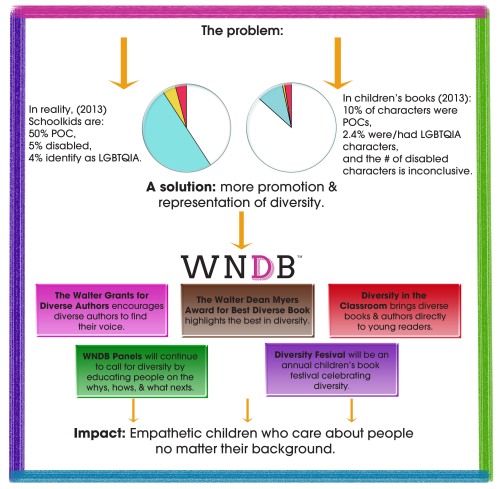
You can help make a difference by making a donation.
There are lots of things you can receive by contributing to the cause. Example: AGENT critiques and EDITOR critiques from editors at Big 5 publishing houses.
An unforgettable opportunity to have a private dinner in NYC with incredible bestselling & award-winning authors Jacqueline Woodson AND Matt de la Peña
Coming soon – a limited number of discounted registrations for Fans of SCBWI – including a VIP critique at their annual LA conference in 2015! Many thanks to Lin Oliver, Sara Rutenberg and Kim Turrisi for offering this. Can’t wait to see how quickly they go!
Here’s the link to the WNDB campaign: http://igg.me/at/diversebooks Maybe even find something you could give as a holiday gift with your donation.
Talk tomorrow,
Kathy
Filed under:
Agent,
authors and illustrators,
children writing,
Editors,
Events,
need to know,
opportunity,
Publishing Industry Tagged:
Agent and Editor Critiques,
Matt de la Pena,
Private Dinner in NYC Jacqueline Woodson,
SCBWI Discounted Registrations,
We Nee Diverse Books 


By: Kathy Temean,
on 10/25/2014
Blog:
Writing and Illustrating
(
Login to Add to MyJacketFlap)
JacketFlap tags:
Kudos,
HarperCollins Childrens,
Lexa Hillyer,
Gayle Aanensen,
Hallee Alderman,
Proof of Forever,
Senior Editor Karen Chaplin,
Agent,
News,
Book,
Editors,
Add a tag
CALL FOR ILLUSTRATIONS: Please email to me any illustrations (at least 500 pixels wide) you think I could use with November and December posts. It is a nice way to keep your name out in the public. Please make sure you include a short blurb about yourself with your website link.
DO YOU HAVE A HALLOWEEN POEM? I will be posting an Halloween poem from Eileen Spinelli on Thursday this week and will post a few other Halloween poems that same day, if I receive any. I need them by 5 pm on Wednesday in order to post for Thursday.
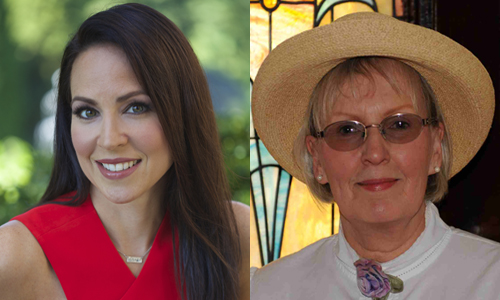
Hallee Adelman and Gayle Aanensen
Hallee Adelman is represented by Jill Corcorcan.
Gayle Aanensen has a new book coming out next month for the holidays.
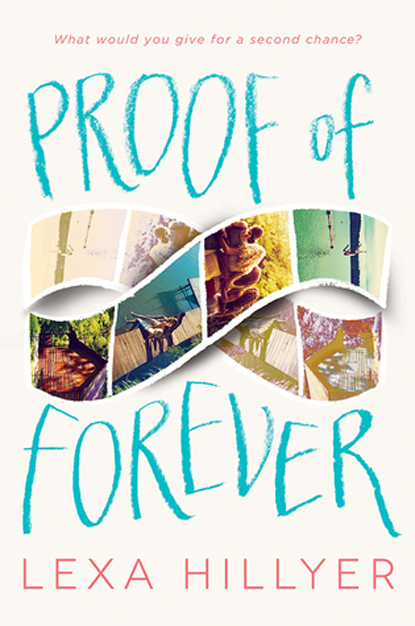
Lexa Hillyer reveals the cover of PROOF ABOUT FOREVER that is coming out June 2, 2015.
At Harper Children’s, Karen Chaplin has been promoted to senior editor, In addition, Alex Arnold has been promoted to assistant editor, Katherine Tegen Books.
At Carina Press, Kerri Buckley has been promoted to senior editor.
At HarperCollins Children’s, Christopher Hernandez and Stephanie Stein have been promoted to associate editor, while Alice Jerman moves up to assistant editor.
Talk tomorrow,
Kathy
Filed under:
Agent,
Book,
Editors,
Kudos,
News Tagged:
Gayle Aanensen,
Hallee Alderman,
HarperCollins Childrens,
Lexa Hillyer,
Proof of Forever,
Senior Editor Karen Chaplin 


By: Kathy Temean,
on 10/13/2014
Blog:
Writing and Illustrating
(
Login to Add to MyJacketFlap)
JacketFlap tags:
awards,
Book,
Editors,
Kudos,
Eileen Cameron,
Doris Ettlinger,
Jennifer Reinharz,
Sarah Dotts Barley,
G Is For Garden State,
Kelly Calabrese,
Mamalode Magazine,
Add a tag
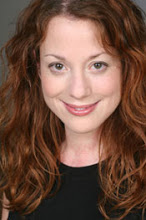 Sunday night I was walking the Season Premier of The Walking Dead (Yes, I’m guilty of watching a show with Zombies – who knew?).
Sunday night I was walking the Season Premier of The Walking Dead (Yes, I’m guilty of watching a show with Zombies – who knew?).
Anyway, they always have great commercials that tie into the theme of the show and KELLY CALABRESE was the main female in the commercial. So exciting! Kelly is an actress and writer from NYC and someone who is very active with volunteering with the NJSCBWI. Congratulations, Kelly!
If you have Cable TV and have on demand, you could watch it to see Kelly. She is the redhead in the first or second commercial.
_________________________________________________________
 Eileen Cameron and Doris Ettlinger new book RUPERT’S PARCHMENT, Story of Magna Carta! on the granting of Magna Carta will be available in bookstores on February 2015 to help celebrate the 800th Anniversary on June 15, 2015.
Eileen Cameron and Doris Ettlinger new book RUPERT’S PARCHMENT, Story of Magna Carta! on the granting of Magna Carta will be available in bookstores on February 2015 to help celebrate the 800th Anniversary on June 15, 2015.
Eileen and Doris’ book, G IS FOR THE GARDEN STATE, has been chosen by the NJ 350th Anniversary Committee as one of the best 101 books on NJ for the Anniversary.
_________________________________________________________

Mamalode is a magazine. A website. A movement. Their readers and writers are moms—with a smattering of dads, kids, grandparents, aunts, uncles and friends.
On October 8th, Mamalode(Parenting/Motherhood Website) Magazine published Jennifer Reinharz most recent blog post, “The Day I Deleted Minecraft; a letter to my son.” She is very excited about the opportunity of becoming a contributing writer for the magazine.
From October 8th-November 8th Mamalode will track the number of “unique views” of Jennifer’s essay on their site. The number of views, likes, comments, and shares is directly tied to her recognition (financial and otherwise :-).
Jennifer wrote saying, “Like many of us, my dream is to be a published Kidlit author with agent representation. However, the contest and writing opportunities, or as I like to call them “nuggets” that you often share are worth pursuing. My path to Kidlit author has yet to be a straight line, but I can’t help but think that getting a chance to connect and share one of my stories with the Mommies, etc. is an example of heading right direction.
So help Jennifer and please click this link to her article:
http://mamalode.com/story/detail/the-day-i-deleted-minecraft-a-letter-to-my-son
______________________________________________________________________________

Sarah Dotts Barley
Sarah Dotts Barley has joined Flatiron Books as senior editor, focusing on YA crossover. Previously, Barley was an editor at Harper Children’s/HarperTeen.
Anne Heltzel has joined Abrams as editor, primarily acquiring books for its middle grade and teen imprint, Amulet Books. She worked previously as an associate editor at Razorbill and is also a published author.
At Scholastic, Liza Baker has re-joined the company as vp, executive editorial director of Cartwheel and Orchard Books. She was most recently executive editorial director, Little, Brown Books for Young Readers.
Talk tomorrow,
Kathy
Filed under:
awards,
Book,
Editors,
Kudos Tagged:
Doris Ettlinger,
Eileen Cameron,
G Is For Garden State,
Jennifer Reinharz,
Kelly Calabrese,
Mamalode Magazine,
Sarah Dotts Barley 

I had the pleasure last month of attending the Agents' Party at Foyles bookshop on Charing Cross Road, London, organised by the Society of Children's Book Writers and Illustrators (SCBWI).
It was called a party, but I'd say that's stretching the term; despite the free wine and nibbles, gratefully received, this was a place to pay full attention.
The agents attending were a good cross-section. Those on the panel were:
- Ella Kahn DKW Literary Agency
- Jo Williamson Antony Harwood Ltd
- Julia Churchill A.M. Heath Literary Agents
- Lauren Pearson Curtis Brown
- Penny Holroyde Caroline Sheldon Literary Agents
- Yasmin Standen Standen Literary Agency.
There were also other agents in the room:
- Alice Williams David Higham Associates
- Bryony Woods DKW Literary Agency
- Elizabeth Briggs LAW Literary Agents
- Eve White and Jack Ramm Eve White Literary Agent
- Hannah
Whitty Plum Pudding Illustration
- Louise Burns Andrew Mann Literary Agency.
In the assembly were up to 80 of us writers and illustrators. On the way in we were handed two badges to fill in and stick onto our clothing: one saying our name, and the other our favourite children's character.
I spotted at least one person who'd chosen a character from their own book. There's confidence for you.
Who did I choose? –
Skellig, the brilliant creation from David Almond's beautiful novel, a broken winged human found in a garden shed who, maybe, has miraculous powers. I thought he might bring me good luck.
Thus protected, I entered the airy new seminar room on the top floor of the wonderful new bookshop (they've moved a few doors down the hill away from the Crossrail engineering works. I went to the old bookshop first by mistake – shows how long since I was last there!)
(ASIDE: I remember the days when Foyles was completely disorganised, full of dusty piles of randomly assorted books that the overworked staff never got around to sorting out. If you wanted a book, it could take you days to burrow through them, like looking for a diamond in a snow drift, you'd have to take a whole week off work. While the old bookshop was definitely Dickensian, the new one is well into the 21st-century.)
Yes! There were a few familiar faces, very nice to see some old friends I hadn't seen for ages. (I confess I am a lapsed SCBWI-er, recently returned to the fold.)
So first of all there was a panel with Nick Cook as the ringleader, and lots of questions being asked about what agents are looking for, and how they make their choices, and then we could queue up to talk to them individually.
Here's what I took away from it:
In the younger age group, humour is popular and perhaps something with a strong literary bent. Others are looking for something more quirky, but above all they are looking for a powerful voice, something with attitude, strong and moving. Some of them were looking for a paranormal story, some for something with lots of twists.
Other keywords for older readers included dark, emotional, historical, with flow, written from the heart, and another interesting thing was said by Ella: "I know it's ready to be submitted to a publisher when I get lost in it".
That is really important in the context of answering the question: "When do I submit? – Either to a publisher or an agent". The answer is, don't send it in until you are absolutely sure it is ready for publication; is it in the form that you would like to see it in print? Because if it is, then the agent or editor receiving it will stop looking for mistakes and become absorbed, as if they were reading a book that had already been published.
And then all the agent has to do is send it straight off to their favourite editor. With absolutely no work for them. What could be better?
In connection with this, another piece of advice was: take your time. There's no rush to submit, not even when an agent gets back to you and suggests some changes. It's far better to get it right than to get right back.
That certainly good advice and probably the best thing I took away from it.
Website:
davidthorpe.info. My new book,
Stormteller, is out at the end of the month.

By: Maryann Yin,
on 10/3/2014
Blog:
Galley Cat (Mediabistro)
(
Login to Add to MyJacketFlap)
JacketFlap tags:
Editors,
Revolving Door,
Condoleezza Rice,
Bill Gates,
David Baldacci,
Jay Leno,
Pete Sampras,
Maria Shriver,
Jeffrey Archer,
John Lescroart,
Rick Horgan,
Add a tag
 Rick Horgan has been hired to serve as vice president and executive editor at Scribner, an imprint at Simon & Schuster.
Rick Horgan has been hired to serve as vice president and executive editor at Scribner, an imprint at Simon & Schuster.
Here’s more from the press release: “In a distinguished career that has spanned decades, Rick Horgan has worked with more than 400 authors and edited—across a variety of genres—more than ninety national bestsellers, including the recently published The Good Spy by Kai Bird. Horgan’s books have won numerous awards and honors, such as the Pulitzer Prize for Tom Reiss’ The Black Count, and the PEN Literary Award for Marshall Jon Fisher’s A Terrible Splendor.”
Some of the authors he has worked with in the past include Bill Gates, Condoleezza Rice, Jay Leno, Maria Shriver, Pete Sampras, David Baldacci, Jeffrey Archer, and John Lescroart. With this new role, Horgan will acquire both commercial fiction and nonfiction manuscripts. In nonfiction, Horgan will focus on memoirs, politics, sports, current events, biographies, and business books.
New Career Opportunities Daily: The best jobs in media.

By: Kathy Temean,
on 10/1/2014
Blog:
Writing and Illustrating
(
Login to Add to MyJacketFlap)
JacketFlap tags:
Tips,
reference,
Advice,
Editors,
submissions,
article,
Elizabeth Law,
need to know,
5 Ways to Follow Up With An Editor or Agent,
Add a tag
I receive so many questions about what to do when you do not get a reply to what you submitted. I think we all will be interested in this article written by Elizabeth Law about how to handle the situation.
5 WAYS TO FOLLOW UP WITH AN EDITOR OR AGENT AND WHEN TO DO IT :
Waiting for a reply can seem like watching the tumbleweeds roll…
#1. Maybe an editor said something encouraging to you at a conference, and, as requested, you sent them your manuscript. Since then it has been radio silence. Here’s what you can do. After 10-12 weeks, follow up with an email, reminding him or her, “we met at XXX, you said you’d like to take a look at my story about XXX, and because 10-12 weeks have passed, I wanted to follow up. Here is my manuscript again, thank you very much for your time and consideration.” That’s right, attach the manuscript, don’t have the editor go hunting for your email from 10 weeks ago. This way they can click and start reading. If you haven’t heard back in another month, move on.
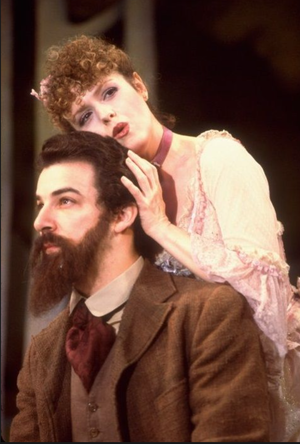
Mandy and Bernadette knew it in Sunday in the Park with George: you’ve got to Move On.
(In this case, move on means submit to the next person on your list, and don’t expect ever to hear back from the original publishing house. You don’t need to officially withdraw the manuscript. If by some miracle the first editor later says he or she is interested in your book, and you haven’t yet sold it, then great. But meanwhile you’ve taken your career into your own hands.)<img Mandy and Bernadette knew it in Sunday in the Park with George: you’ve got to Move On.”
Mandy and Bernadette knew it in Sunday in the Park with George: you’ve got to Move On.
#2. Regrettably, in this era, silence is the new no. Many literary agents have realized they don’t have the time to reply to every query they receive, so they’ve enacted a policy of “if you don’t hear from us in ___ weeks, assume we’ve passed.”
Here’s what to do when you’ve queried and agent and the allotted time to hear back has passed: MOVE ON.
Waiting for just the right literary agent or editor to say yes to you is like being in 7th grade and waiting for just the right boy, the one you know is perfect and you will spend the rest of your life with, to ask you out. You are much, much better off moving on to the guy standing right next to him in the lunch line.
This is also a good rule for a publishing house accepting unsolicited manuscripts, and for editors or publishers who are accepting submissions for a certain period after a conference. If you don’t hear back from them after 12-16 weeks, assume it’s a no and move on.
#3. You have signed with a literary agent, but they aren’t getting back to you. Maybe they don’t return your calls, maybe they don’t answer your emails. Everyone slips up now and again, of course, and that’s not what I’m talking about. Have you left a few messages in a row for your agent, either by email or phone, and not gotten a reply? Has that happened several times? End the relationship. The LAST thing you want is an agent who doesn’t return your calls or emails. The publishing process is frustratingly slow and thorny and fraught with all sorts of issues. Your agent is your champion; he or she goes into battle for you. You do not want to be in that battle not knowing when your weaponry is going to show up. Send an email and say you’re terminating the relationship. Do it now.
(And don’t be scared. Most agents are excellent. But I get asked about this every few months, so I’m including it.)
#4. An editor tells you he is taking your manuscript to an acquisitions meeting, then you don’t hear anything further. Follow up, by phone or email, remembering the rule, “always be polite and to the point.” Say “You said you were bringing my book to the committee, has there been a response?” I know, I know, who wants to send that email and hasten the chance of hearing “I’m afraid the committee passed?” But it’s better to hear “no” and move on. It’s also possible your editor needs to be prodded to get that book onto the meeting agenda. You just don’t know. You need to follow up.
Nota bene: ALWAYS be nice. Never lose your cool and yell at an editor, even by email, even when he deserves it. First, you never know the full story—I got screamed at, really screamed at, once when it was my boss causing the delay, but what could I do but take the heat? And second, venting is what you have friends for. The editor is disorganized, doesn’t value your time, has kept you hanging, repeatedly breaks her word about when she’s going to reply… all true. Still, be professional, courteous, and polite. For one thing, when a writer is nice and understanding, we, the editors, only feel more guilty and determined to treat you well and to finally get you an answer. Secondly, one day you may need that person you just reamed out. He may be sitting in the audience at sales conference, and be able to tell a rep “Oh, I know that author, so talented.” Or you may end up sitting next to that editor on a panel at a conference, who knows? Don’t burn bridges. Act professionally and then go out for drinks with your BFF and get it all off your chest.
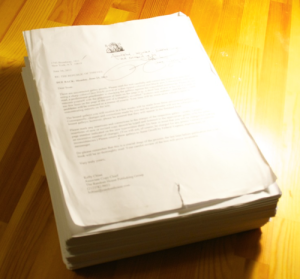 #5:
#5: Perhaps your book is under contract,
but your editor isn’t getting back to you with editorial notes, or with anything else. You want to revise, you have another book you need to work on, and you need to know what’s going on. But although you’ve emailed the editor three times to ask about the book’s schedule, you hear nothing. If you have an agent, easy, just tell the agent and he or she will deal with it. (Unless the agent doesn’t return your calls, in which case, see #2). But if you don’t have an agent, and you aren’t hearing back from your editor? Email their boss. Yup. Email the publisher, remembering to be professional and concise, saying “
I haven’t had an answer to my questions about the book’s schedule and I’m getting worried that my revision might conflict with another project; of course I understand how busy my editor is, but I wonder if you have information for me?” The publisher then forwards it to the editor who deals with it immediately.
Filed under:
Advice,
article,
Editors,
need to know,
reference,
submissions,
Tips Tagged:
5 Ways to Follow Up With An Editor or Agent,
Elizabeth Law 


By: Maryann Yin,
on 9/26/2014
Blog:
Galley Cat (Mediabistro)
(
Login to Add to MyJacketFlap)
JacketFlap tags:
Emma Straub,
Nick Flynn,
Cheryl Strayed,
Sari Botton,
Editors,
Elizabeth Gilbert,
Simon & Schuster,
Susan Orlean,
Dani Shapiro,
Add a tag
 Last year, Sari Botton served as the editor of an anthology called Goodbye to All That: On Loving and Leaving New York. Cheryl Strayed, Dani Shapiro, Emma Straub, and 25 other writers penned essays on how they renounced residency from New York city.
Last year, Sari Botton served as the editor of an anthology called Goodbye to All That: On Loving and Leaving New York. Cheryl Strayed, Dani Shapiro, Emma Straub, and 25 other writers penned essays on how they renounced residency from New York city.
Botton has been working on a follow-up entitled Never Can Say Goodbye: Writers on Their Unshakable Love For New York. Some of the contributors to the new project include Elizabeth Gilbert, Susan Orlean, and Nick Flynn.
Touchstone, an imprint of Simon & Schuster, will release the book on October 14, 2014. What do you think?
New Career Opportunities Daily: The best jobs in media.
.jpg?picon=1806)
By:
Lari Don,
on 8/29/2014
Blog:
An Awfully Big Blog Adventure
(
Login to Add to MyJacketFlap)
JacketFlap tags:
Young Adult,
young adult fiction,
editing,
editors,
YA fiction,
revision,
rewrite,
editing fiction,
writing for teens/YA,
Lari Don,
redrafting.,
Add a tag
Publishers want lots of ‘stuff’ from authors now. Not just the book, but lots of other stuff. Content, it’s called, for online things.
One of the bits of content I’ve given my publishers recently is a file of deleted scenes, from my new(ish) teen thriller
Mind Blind.
It wasn’t hard for me to find half a dozen deleted scenes, because I delete lots from my manuscripts as I rewrite and redraft. It’s not unusual for me to reduce the length of a book by 20,000 words or more between first draft and final publication. Which sounds very inefficient – wouldn’t I be better just writing shorter books in the first place?
But I’m not a planner and plotter. I discover the story as I write, as I follow the characters on their journey, and that means diversions and doubling back. I never deliberately write anything that I know is irrelevant at the time, every word helps me find out about the characters, their reactions to problems and my own feelings about the story. But once I reach the end and get a sense of the main thrust of the story, it’s usually clear that I've regularly wandered off the narrative path, and that some scenes are now unnecessary. They may have been necessary to get me to the end, but they’re not necessary to get the reader to the end. So I'm ruthless in slashing them out. I reckon that if you can slice out a scene without it seriously affecting the rest of the story, it probably wasn’t that important.
And in a thriller like MindBlind, where it’s very important to keep the pace up and the pages turning, I also removed scenes or parts of scenes because they slowed the story down too much. (
Here’s an example of one.)
And sometimes I cut a scene, not because it’s slowing the story down or because it’s an unnecessary diversion, but because I come up with a stronger idea once I know the story and characters better. However, the original scene is still part of the way I got to know the character, so it’s part of my history with them.
Here’s an example of that – it’s the first scene I ever wrote about Ciaran Bain, the hero (anti-hero) of the book. It’s not in the book, but it’s still the place I first met him!
Of course, it’s misleading to suggest that all this slashing and slicing is my idea. Quite a lot of it is, but some of it is in response to gentle prompts from my wonderful editor.
 |
| a mountain of many Mind Blind manuscripts |
So, I have no problem removing large chunks of my first draft or even my fourteenth draft, because as I’m writing, I know that I’m just discovering the story, not finding the perfect way of telling it first time around. And I know that it takes a lot of work to make that original mess of scribbled ideas into a book.
But having taken all this stuff out, why on earth would I want to show it to anyone? These deleted scenes have often been removed quite early in the process, so they’re not that polished (why would I polish them, once I’ve deleted them?) So it does feel quite weird and slightly uncomfortable, revealing these unfinished bits of my creative process to the public gaze.
Even if these are scenes that I took out for plot or pace reasons, rather than pieces of writing I don’t like, they are still parts of the story that didn’t make it into the book. So is it a bit of a risk to show less than perfect examples of your writing to the world? And why on earth do it?
The first reason is the pragmatic one of feeding the voracious social media monster. (This is not a particularly good reason.)
But I wonder if a much better reason is that realising how much an author cuts from their early drafts can be useful, especially for young writers. It’s a very practical way to show that published writers don’t get it right all the time, that our first drafts are just the start of the process and that we have to work at them, slash at them, perhaps radically change them, to get them into shape. Deleted scenes are perhaps the online version of showing manuscripts covered in lots of scribbles and scorings out to groups of kids at author visits. ‘Look, I don’t get it right first time, so you don’t have to either. Just write, and see what happens!’
So, while I was wincing and cringing this week as yet another deleted scene appeared on Tumblr, I wondered:
How much do other writers delete?
Are other writers happy to let the world see the bits they sliced out?
And do readers learn anything about the writing process from deleted scenes?
Lari Don is the award-winning author of 21 books for all ages, including a teen thriller, fantasy novels for 8 – 12s, picture books, retellings of traditional tales and novellas for reluctant readers.
 I know what you want: To get more freelance writing jobs. And to earn good money doing what you love. And to enjoy the freedom that comes with controlling your own career.
I know what you want: To get more freelance writing jobs. And to earn good money doing what you love. And to enjoy the freedom that comes with controlling your own career.
That’s nice — but guess what? Editors don’t care what you want.
All editors care about is that you make their jobs — and their lives — as easy as possible. And for you, that means going beyond turning in great work on time. (Turning in great work on time is the bare minimum requirement.)
If you want to keep raking in the freelance writing gigs, you need to be freaking epic. You need to go waaaaaay beyond what the hordes of other freelance writers are doing.
Here’s how to level it up – and get more work:
Give Without Getting
Everyone loves a surprise freebie. What little extra can you offer your editor clients, without going broke yourself?
How about this: When you come across some news tidbit or research study you think would be perfect for a particular publication, but don’t want to pitch it yourself, send it to the editor anyway. Tell him, “I found this study I thought you’d be interested in. Hope you find it useful for X magazine!”
Or maybe you’re working on an article and come across some information that is important, but doesn’t quite fit in the piece. Write it up as a quick sidebar, and tell the editor, “I had some extra information, so I wrote up a sidebar you can use if you have room. Hope you like it!”
With some creativity, you’ll find many easy, painless ways to offer little extras to your clients. That puts you ahead of all those writers who turn in an article and call it a day.
Get the Best (Not the Easiest!) Interview Sources
Too many writers pick the first expert sources that come to mind: They go for people they already happen to know, like local professionals. “I need to interview a podiatrist? Hey, there’s one on my street!” Or they send out a HARO request and choose from among the people who respond.
When I recently wrote an article for a national health magazine on pet health, I needed to find two expert sources. Of course, I have a local vet who is great. But instead of going the easy route, I called a national veterinary organization and gave the PR rep my exact specifications: I wanted one male and one female vet from different areas of the country — and they needed to have a published book through a traditional publisher or work at a well-known veterinary hospital.
I got exactly what I wanted.
My editor did not ask for these requirements; I just knew these would be the very best sources and would impress the heck out of her.
When you’re on the search for sources for your articles, think of who would be the absolute best person to interview. You may think they’re out of your league, but you won’t know until you ask — and often, you’ll be surprised.
Push Your Style
If you can write in a clear, readable style, that probably puts you in the top 25% of freelance writers out there. But where you really create value and become epic is in bringing an amazing style to everything you write.
When I write an article, in my final edit, I go over every sentence and ask myself, “Is this the best possible way to express this idea? Is there any way I can make it more concise/interesting/entertaining?”
Writing for magazines (and copywriting, by the way) is about more than conveying ideas to readers in grammatically correct sentences. You need to do it in a way that entertains and keeps them interested as well. The perfect turn of phrase, the (truly) humorous aside, the killer lede — these are the things that keep readers — and editors — coming back.
So the next time you write an article, or a query, go over it one last time and make sure every sentence is as tight and compelling as it can be.
Don’t be one of the many writers who say, “I turned in an article on time. My sentences are grammatically correct. The end. Next!” Push yourself to be freaking epic and you’ll be rewarded with epic assignments in turn.
How about you: What do YOU do to level it up in your writing and business? What have editors’ responses been? Let us know in the Comments below!

By: Kathy Temean,
on 8/13/2014
Blog:
Writing and Illustrating
(
Login to Add to MyJacketFlap)
JacketFlap tags:
News,
Editors,
Publishing Industry,
Kudos,
need to know,
SCBWI Work-in-Progress Grant,
Jennifer Reinharz,
Writer's Digest Annual Contest,
Karen Fortunati,
The D-Day List,
The Pleasant Passover,
Add a tag
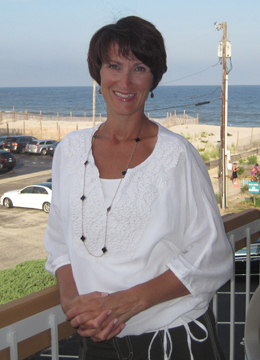 It seems like I’ve been hearing from a lot of readers of this blog with good news. Some I can report now, Like Jennifer Reinharz who sent me this news:
It seems like I’ve been hearing from a lot of readers of this blog with good news. Some I can report now, Like Jennifer Reinharz who sent me this news:
The 83rd Annual Writer’s Digest Writing Competition notified me last week that my blog post, “A Pleasant Passover” was awarded 5th place in the Inspirational Writing category.
She said, “If it wasn’t for your blog, I wouldn’t have entered the contest!”
You can read it on Jennifer’s blog: http://redsaidwhat.com/2014/05/01/128/
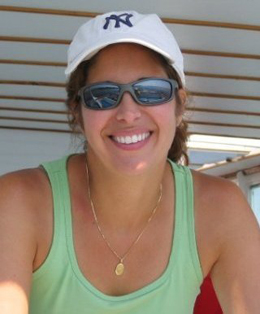 Then I heard from Karen Fortunati. She told me after seeing my post about the SCBWI Work-in-Progress Grant, she submitted her Contemporary YA novel, The D-Day List, and WON!
Then I heard from Karen Fortunati. She told me after seeing my post about the SCBWI Work-in-Progress Grant, she submitted her Contemporary YA novel, The D-Day List, and WON!
Here’s a blurb about her book:
For seventeen-year-old Catherine Pulaski, life is intolerable with bipolar disorder and depression. There’s only one way out but before she can kill herself, she’s got to accomplish the one item on her D-Day List. And if she does, it may change everything.
I have a feeling I missed someone, so if I missed you please email me again. Thanks!
Here are some other industry changes. Many of you know the lovely Allison Wortche and Katherine Harrison. I was so happy to hear their news.
At Knopf Children’s, Allison Wortche has been promoted to senior editor while Katherine Harrison moves up to associate editor.
Phaidon has hired Cecily Kaiser as publishing director, Children’s Books and Meagan Bennett as art director for the division, both reporting to Deb Aaronson out of the company’s New York offices.
Jonathan Jao will join Harper on September 8 as vp, executive editor, reporting to Jonathan Burnham. Previously he was a senior editor at Random House.
Lauren Scobell has joined Macmillan Children’s Publishing Group as director, Swoon Reads.
You should get out your Children’s Writer’s and Illustrator’s Market by Chuck Sambuchino and make the changes.
Talk tomorrow,
Kathy
Filed under:
Editors,
Kudos,
need to know,
News,
Publishing Industry Tagged:
Jennifer Reinharz,
Karen Fortunati,
SCBWI Work-in-Progress Grant,
The D-Day List,
The Pleasant Passover,
Writer's Digest Annual Contest 


By: Kathy Temean,
on 7/26/2014
Blog:
Writing and Illustrating
(
Login to Add to MyJacketFlap)
JacketFlap tags:
2014 NJSCBWI Conference,
Agent Responses,
Editor Responses,
From State of the Market Report,
Future of Indy Book Stores,
Agent,
Editors,
stats,
Publishing Industry,
Book Stores,
Add a tag
One of the questions I asked Editors and Agents was about the Indy Book Stores. Over the last year, I’ve heard so many writers and illustrators voice their concern about the stores future. We’ve seen some of our favorite book stores shut their doors and every publishing professional knows how lost we would be without them out there to help promote our books, so I had to ask.
First slide responses from editors:
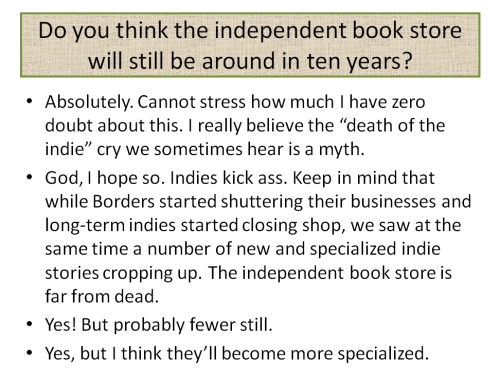
Second slide shows agent responses.
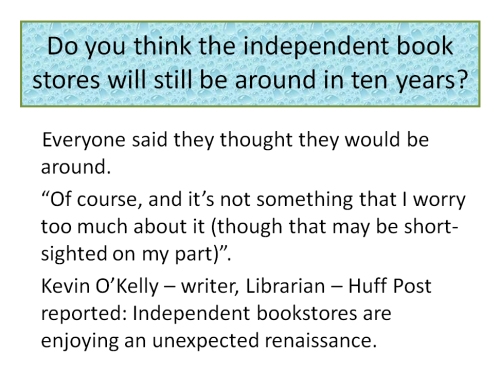
Talk tomorrow,
Kathy
Filed under:
Agent,
Book Stores,
Editors,
Publishing Industry,
stats Tagged:
2014 NJSCBWI Conference,
Agent Responses,
Editor Responses,
From State of the Market Report,
Future of Indy Book Stores 

View Next 25 Posts
 The executives at Simon & Schuster Children’s Publishing will launch an eponymous imprint for editorial director and vice president Caitlyn Dlouhy. Caitlyn Dlouhy Books will be under the Atheneum Books for Young Readers division.
The executives at Simon & Schuster Children’s Publishing will launch an eponymous imprint for editorial director and vice president Caitlyn Dlouhy. Caitlyn Dlouhy Books will be under the Atheneum Books for Young Readers division.










 Paul Stevens has been hired as an acquisitions editor for Quirk Books. His start date has been scheduled for January 2015.
Paul Stevens has been hired as an acquisitions editor for Quirk Books. His start date has been scheduled for January 2015.


 Sunday night I was walking the Season Premier of The Walking Dead (Yes, I’m guilty of watching a show with Zombies – who knew?).
Sunday night I was walking the Season Premier of The Walking Dead (Yes, I’m guilty of watching a show with Zombies – who knew?). Eileen Cameron and Doris Ettlinger new book RUPERT’S PARCHMENT, Story of Magna Carta! on the granting of Magna Carta will be available in bookstores on February 2015 to help celebrate the 800th Anniversary on June 15, 2015.
Eileen Cameron and Doris Ettlinger new book RUPERT’S PARCHMENT, Story of Magna Carta! on the granting of Magna Carta will be available in bookstores on February 2015 to help celebrate the 800th Anniversary on June 15, 2015.

 Rick Horgan has been hired to serve as vice president and executive editor at Scribner, an imprint at Simon & Schuster.
Rick Horgan has been hired to serve as vice president and executive editor at Scribner, an imprint at Simon & Schuster.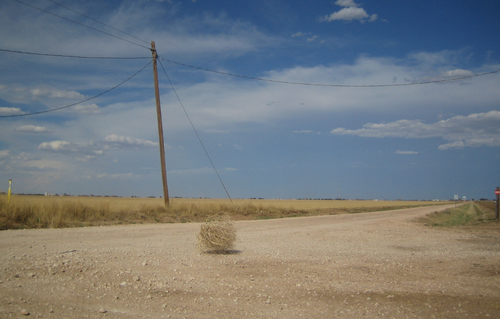



 #5: Perhaps your book is under contract, but your editor isn’t getting back to you with editorial notes, or with anything else. You want to revise, you have another book you need to work on, and you need to know what’s going on. But although you’ve emailed the editor three times to ask about the book’s schedule, you hear nothing. If you have an agent, easy, just tell the agent and he or she will deal with it. (Unless the agent doesn’t return your calls, in which case, see #2). But if you don’t have an agent, and you aren’t hearing back from your editor? Email their boss. Yup. Email the publisher, remembering to be professional and concise, saying “I haven’t had an answer to my questions about the book’s schedule and I’m getting worried that my revision might conflict with another project; of course I understand how busy my editor is, but I wonder if you have information for me?” The publisher then forwards it to the editor who deals with it immediately.
#5: Perhaps your book is under contract, but your editor isn’t getting back to you with editorial notes, or with anything else. You want to revise, you have another book you need to work on, and you need to know what’s going on. But although you’ve emailed the editor three times to ask about the book’s schedule, you hear nothing. If you have an agent, easy, just tell the agent and he or she will deal with it. (Unless the agent doesn’t return your calls, in which case, see #2). But if you don’t have an agent, and you aren’t hearing back from your editor? Email their boss. Yup. Email the publisher, remembering to be professional and concise, saying “I haven’t had an answer to my questions about the book’s schedule and I’m getting worried that my revision might conflict with another project; of course I understand how busy my editor is, but I wonder if you have information for me?” The publisher then forwards it to the editor who deals with it immediately. Last year, Sari Botton served as the editor of an anthology called Goodbye to All That: On Loving and Leaving New York. Cheryl Strayed, Dani Shapiro, Emma Straub, and 25 other writers penned essays on how they renounced residency from New York city.
Last year, Sari Botton served as the editor of an anthology called Goodbye to All That: On Loving and Leaving New York. Cheryl Strayed, Dani Shapiro, Emma Straub, and 25 other writers penned essays on how they renounced residency from New York city.

 It seems like I’ve been hearing from a lot of readers of this blog with good news. Some I can report now, Like Jennifer Reinharz who sent me this news:
It seems like I’ve been hearing from a lot of readers of this blog with good news. Some I can report now, Like Jennifer Reinharz who sent me this news: Then I heard from Karen Fortunati. She told me after seeing my post about the SCBWI Work-in-Progress Grant, she submitted her Contemporary YA novel, The D-Day List, and WON!
Then I heard from Karen Fortunati. She told me after seeing my post about the SCBWI Work-in-Progress Grant, she submitted her Contemporary YA novel, The D-Day List, and WON! 

Reblogged this on Darlene Beck-Jacobson.
My first book, Vampires Don’t Wear Polka Dots, came out almost 25 years ago. It had Melody, a black third-grader who helped her three friends save the world from her vampire teacher. Since then I’ve always tried to be aware of the diverse population of our country. For instance, the mermaids in Mermaid Tales are diverse. It’s important that kids see themselves in the books they are reading, in order to make that all important connection.